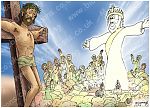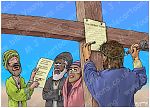Bible Cartoon: <-- Philippians : Colossians -->
Click on Add to cart button below shopping cart.
Purchased Bible Cartoons do not have watermarks. Links to Cartoons provided on email once purchase is completed.Colossians
Book type: Letter (Epistle)
Author: Apostle Paul
No. of chapters: 4
Key character(s): God, Jesus, Paul, Timothy, Tychicus, Onesimus, Aristarchus, John Mark, Justus, Epaphras, Luke, Demas, Archippus [1]
Brief description: Colossians – The all-sufficiency of Christ.
01) Greetings, thanksgiving & prayer (1:1-14)
02) Christ is supreme in the universe & in the church (1:15-2:5)
03) False teachings deceive believers into practices that do not free from sin (2:6-3:4)
04) The nature of the new life in Christ & its demands upon the believers (3:5-4:6)
What place does Jesus occupy in relation to the creation & the church? Who can find salvation in Him, & how can they find it? These 2 central issues emerge in the apostle Paul’s letter to the church in Colosse.
False teachers were at work in the church at Colosse (Colossians 2:4,8). For Paul these false teachers represented a threat:
01) To the centrality of Jesus, s redeemer, creator & revealer.
02) To the equality & unity of believers.
Theological conclusions.
Colossians encourages & strengthens Christians by stressing 4 theological themes:
01) Christ’s supremacy & sufficiency.
02) Becoming & being a Christian.
03) The nature of the church.
04) The ethical demands of the Christian life.
Contemporary teaching.
01) Be aware of systems of thought (philosophies) that devalue Christ’s centrality as Revealer, Lord & Saviour.
02) Maintain & defend grace & faith as the only bases for growing Christian maturity.
03) Extreme individualism destroys life together in church.
04) Christ gives us absolute standards of moral conduct.
05) We must stand against a blending of Christian faith with other religious beliefs. Discussion with members of other faith’s may be profitable, but many elements of other religious beliefs are not compatible with Christ & Christianity.
[Source: NIV Disciple’s Study Bible]
The book of Colossians, despite being written nearly 2,000 years ago, is stunningly relevant today, with its warnings against following false philosophies, worshiping angels, and becoming mired in legalism.
Modern Christians are bombarded with false teachings, such as cultural relativism, universalism, Gnosticism, and the Prosperity Gospel. Many books and websites promote undeserved attention to angels, ignoring Jesus Christ as Savior of the world. Despite the Apostle Paul’s clear preaching on grace, some churches still command good works to earn merit with God.
With the rise of atheism and secular humanism, modern believers will find valuable advice in Paul’s short letter to the Colossians.
[Source:http://christianity.about.com/od/newtestamentbooks/a/JZ-Colossians.htm]
Key Verses:
Colossians 1:21-23(ANIV)
Once you were alienated from God and were enemies in your minds because of your evil behavior. But now he has reconciled you by Christ’s physical body through death to present you holy in his sight, without blemish and free from accusation-if you continue in your faith, established and firm, not moved from the hope held out in the gospel. This is the gospel that you heard and that has been proclaimed to every creature under heaven, and of which I, Paul, have become a servant.
Colossians 3:12-15 (ANIV)
Therefore, as God’s chosen people, holy and dearly loved, clothe yourselves with compassion, kindness, humility, gentleness and patience. Bear with each other and forgive whatever grievances you may have against one another. Forgive as the Lord forgave you. And over all these virtues put on love, which binds them all together in perfect unity. Let the peace of Christ rule in your hearts, since as members of one body you were called to peace. And be thankful.
Colossians 3:23-24 (ANIV)
Whatever you do, work at it with all your heart, as working for the Lord, not for men, since you know that you will receive an inheritance from the Lord as a reward. It is the Lord Christ you are serving.
[1]
Fuller list of major characters in Colossians:
| Name | Notes |
| Jesus | ”Saviour”. Christ means “the Anointed One”. (aka Jesus of Nazareth, The Christ, The Messiah, Son of man, Son of God). The central figure of the New Testament, whose life, death, and resurrection are chronicled in the 4 Gospel books. |
| Paul | (aka Saul, “Asked for” Hebrew.) Native of Tarsus, the capital of Cilicia, a Roman province in the south-east of Asia Minor. Jew with Roman citizenship; Pharisee; persecutor of the early Christian church. Converted from Judaism to Christianity after encounter with resurrected Jesus on the road to Damascus (Acts 9:1-30). Thereafter called an apostle (Ro 1:1, 1Co 1:1, 2Co 1:1, Gal 1:1, Eph 1:, Col 1:1, 1Ti 1:1, 2Ti 1:1, Tit 1:1). Author of at least 13 of the 27 books of the New Testament: Romans, Phillipians, 1 & 2 Timothy, 1 & 2 Corinthians, Colossians, Titus, 1 & 2 Thessalonians, Philemon, Galatians, Ephesians. |
| Timothy | Τιμόθεος, Timótheos. Mother was a Jewess convert to Christianity, his father was Greek (Acts 16:1). Resident, and probable native of Lystra a city of Lycaonia. Apostle Paul’s companion and fellow-laborer, one of Paul’s own converts (1 Corinthians 4:17). (Acts 17:14; Acts 18:5; Acts 19:22; Acts 20:4; Romans 16:21; 1 Cor. 4:17; 1 Cor. 16:10; 2 Cor. 1:1, 19; Phil. 1:1; Phil. 2:19; Col. 1:1; 1 Thes. 1:1; 1 Thes. 3:2, 6; 2 Thes. 1:1; 1 Tim. 1:2, 18; 1 Tim. 6:20; 2 Tim. 1:2; Philemon 1:1; Hebrews 13:23) |
| Tychicus | Τύχικος, Túchikos, literally “chance” or “fortuitous”). An Asiatic Christian, mentioned 5 times in the New Testament (Acts 20:4; Ephesians 6:21; Col. 4:7; 2 Timothy 4:12; Titus 3:12). A friend and companion of the apostle Paul on his 3rd missionary journey. Described as “a faithful minister in the Lord” (Ephesians 6:21, 22), who, with Trophimus, accompanied Paul on a part of his journey from Macedonia to Jerusalem (Acts 20:4). He is alluded to also in Col 4:7; Tit 3:12, and 2 Timothy 4:12 as having been with Paul at Rome. Paul sent him to Ephesus, probably for the purpose of encouraging & building up the church there. |
| Onesimus | Ὀνήσιμος, Onésimos, literally, “profitable,” “helpful”. Slave belonging to Philemon (Philemon 1:16), who was a wealthy Christian citizen of Colosse. Onesimus defrauded his master and ran off to Rome where he came into contact with the apostle Paul. Onesimus agreed to return to Colosse & Philemon, after he became a Christian. |
| Aristarchus | Ἀρίσταρχος, Arístarchos, “best ruler”. Was one of those faithful companions of the apostle Paul who shared in his labours and sufferings. Mentioned with Gaius as having been seized by the rioting Ephesians (Acts 19:29). Native of Thessalonica (Acts 20:4; Acts 27:2). Accompanied Paul from Greece via Macedonia (Acts 20:4). Having preceded Paul to Troas, where they waited for him, they traveled with him to Palestine. Next accompanied Paul to Rome (Acts 27:2). There he attended Paul and shared his imprisonment. Mentioned in Colossians 4:10 & Philemon 1:24. |
| John Mark | Ἰωάννης, Iōánnēs represents his Jewish, Mark (Μάρκος, Márkos) his Roman name. Son of Mary (Acts 12:12). Cousin of Barnabas. Referred to by Peter as “my son in Christ” (1 Peter 5:13). Assistant to Paul & Barnabas on their missionary journey (Acts 12:25; 13:5). Cause of the dispute between Paul & Barnabas (Acts 15:36-40). |
| Justus (Jesus) | Ἰοῦστος, Ioústos. A Jew, Jesus Justus, mentioned with Mark and Aristarchus by the apostle Paul in his letters to the Colossians (Col. 4:11). Fellow-worker and one that had been a comfort to him. |
| Epaphras | Ἐπαφρᾶς, Epaphrás, which is a name contracted from Epaphroditus. Not the same as the messenger of the Philippian church. Epaphras was with Paul during a part of his 1st Roman imprisonment (Philemon 1:23). Epaphras was the missionary by whom the Colossian church was established (Colossians 1:7). |
| Luke | Λουκᾶς, Loukás, apparently an abbreviation for Λουκανός, Loukanós, meaning “light-giving” or “luminous”. Gentile Physician. A medical missionary & probable author of Luke’s Gospel & Acts. Paul alone names Luke (Col. 4:14; 2 Tim. 4:11; Philemon 1:24). Proabable physician to, & co-worker of, the Apostle Paul. |
| Demas | Δημᾶς, Dēmás, “popular”. mentioned in Colossians 4:14; 2 Timothy 4:10 & Philemon 1:24, as one who was for a time a “fellow-worker” with the apostle Paul at Rome. Paul wrote (2 Timothy 4:10) that Demas “having loved this present world,” left Paul and went to Thessalonica. No other information is known about him. |
| Archippus | Ἀρχίππος, Archíppos, “Master of the horse”. The apostle Paul wrote of him in Philemon 1:4 as “our fellow-soldier”. Probably a member of Philemon’s family. A Christian minister at the Colossian church. |





